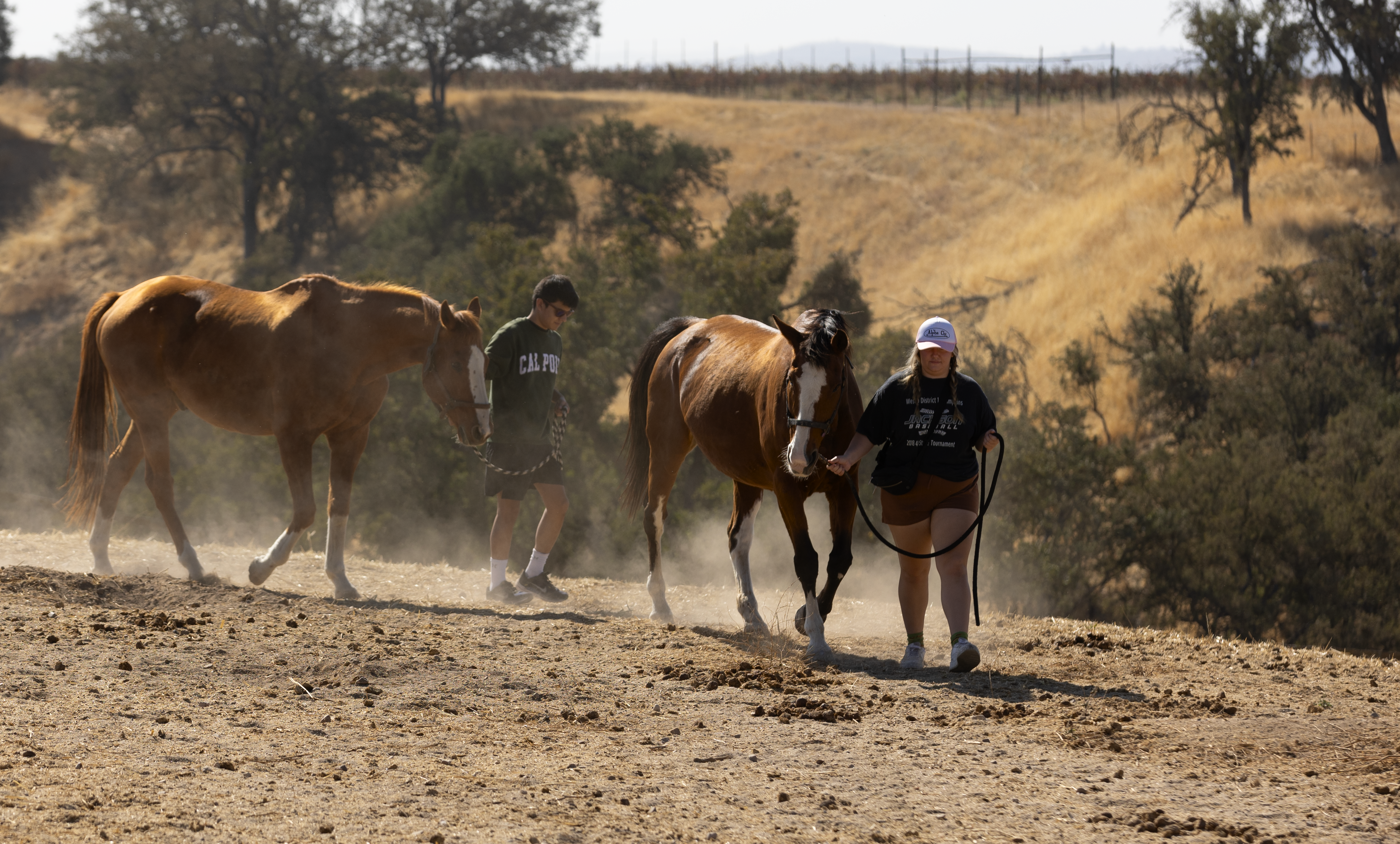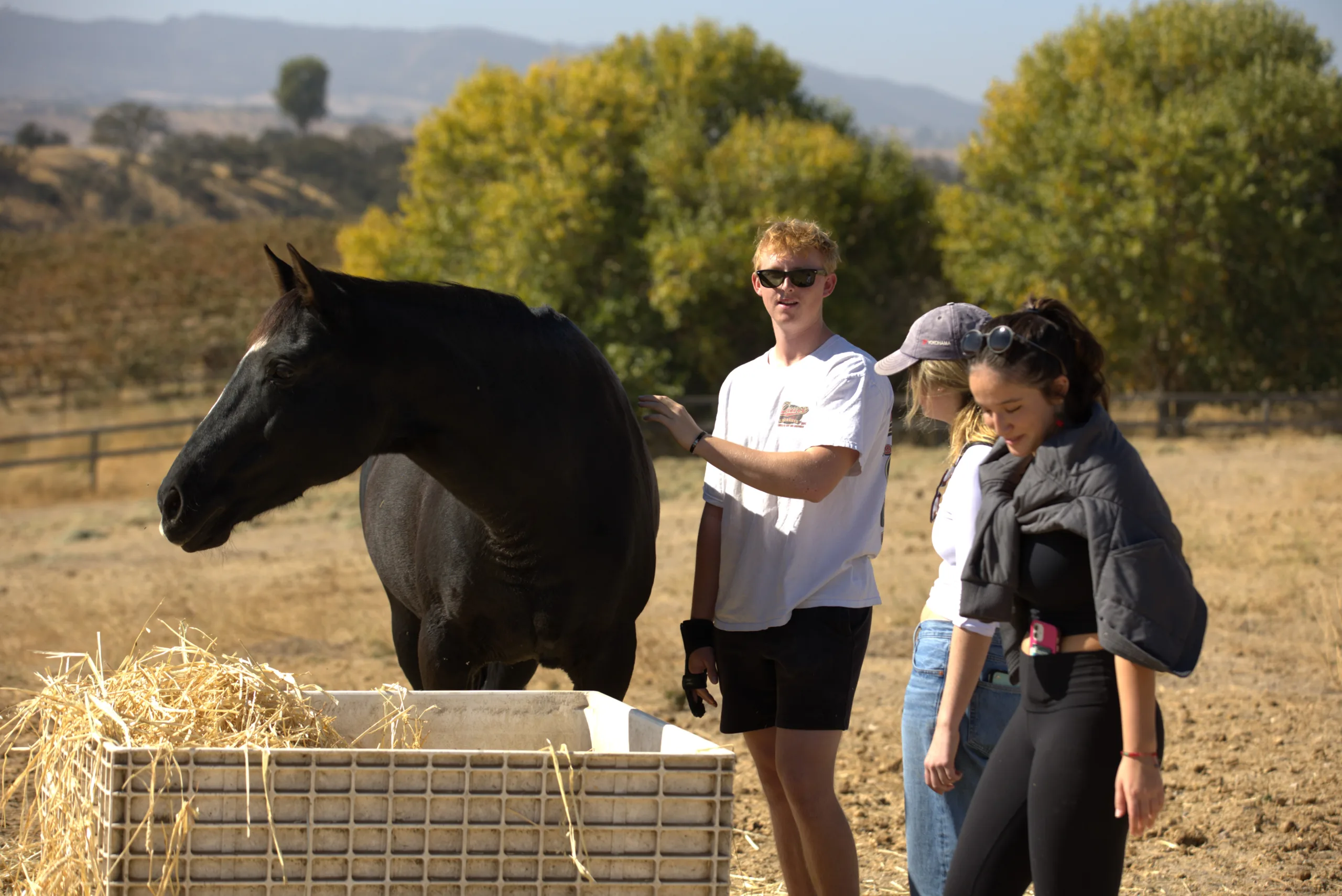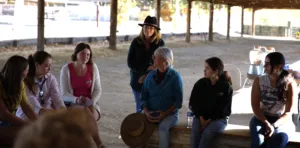Quiet Confidence and Genuine Connections: What Horses Can Teach Us About Leadership and Trust

Business student Adam Gallardo, left, and psychology student Annie Coe lead horses during a leadership retreat in Paso Robles. (Photo/JP Vega)
A horse named Raja eyes me as I approach him with a halter. Meanwhile, a dozen leadership students apprehensively prepare to interact with other horses around me. The ranch is almost completely silent, apart from the sounds of students whispering to their horses and hooves intermittently pawing the ground.
During the fall quarter, organizational behavior and leadership professor Sara Jo Daubert took her class on a field trip to an equine leadership session at Flag Ranch, a horse and human collaboratory in Paso Robles.
“In the honors leadership class we cover many topics, including personality, trust, self-esteem, and servant leadership,” said Daubert. “In addition, understanding communication patterns among peers is emphasized.”

Scott Linden, a student in the Orfalea College of Business, greets a horse with poluitical science major Sophie Azimi (far right) and an unidentified student. (Photo/JP Vega)
Wanting to bring a unique experience into her class this quarter, Daubert took her class to have a hands-on leadership session with horses that have been given a second chance.
“We take in horses who are most at risk of being needlessly euthanized or sent to slaughter illegally, and we give them a natural life through their end of life,” said Flag Ranch co-founder and executive director Kimberly Carlisle. “Then, we pair that with people who come to explore professional and personal development. People who are looking for reflective self-empowerment. People asking questions like, ‘Who are we? Why are we here? What’s getting in the way of our calling, or our service, or our dreams?’”
Horse Time
Flag Ranch is home to 53 horses, six minis, a cohort of dogs and cats, a couple sheep, a pig, and a burro. Today, we would be spending time with six rescued race horses: Joe, Tracer, Raja, Fiona, Faith, and Huck.
Flag Ranch is surrounded by rolling hills and the view of vast grape orchards in the distance. There is a familiar smell of the outdoors, with a thin layer of dust covering the ground and seating furniture scattered around the property.
When we first walked into the ranch, Carlisle greeted us with an instruction:
“This is horse time,” she said. “That means we leave time at the door. Be here with us, with each other and with the horses for the time we’re here.”
“When two people trust each other, you see more success. That’s kind of how it was with the horses. I think when the horse trusts you, and you trust the horse, only then are you able to make progress.”
Adam Gallardo
One of the key elements of our experience with the horses was silence – and the importance of communication through energy instead of words.
Under a covered shelter, Carlisle stands next to a white board and writes the word “Energy” in black marker, then turns to the circle of students sitting around her.
“How can you tell an energy?” she asks. “What are the cues that we’re trying to understand?”

Sara Jo Daubert (standing), a professor in the Orfalea College of Business, takes part in a discussion about leadership and horses. (Photo/JP Vega)
Awareness, Carlisle explains, is essential to effective leadership. “It’s also essential to effective teamwork,” she adds. “And also, to any honest, rewarding, and productive relationship.”
As we approached the horses, we quickly learned that there was no faking confidence here. According to Carlisle, a horse will sense uncertainty – no matter how much we think we’re masking it.
“I had to try really hard to connect with a horse before leading it,” said business sophomore Scott Linden. “A connection had to genuinely be made before any progress was going to happen.”
Students naturally divided into groups as each student engaged with the horse that spoke to them most. I was called by a whimsical and slightly mischievous horse named Raja, who made a habit of head-butting his fellow horses when they were taking up too much of the spotlight.
After getting to know the horses a little bit more, we were tasked with putting a halter on our horse and walking it in a circle. It didn’t take long to understand that if a genuine connection wasn’t made, the horse wouldn’t budge.
“When two people trust each other, you see more success,” said Adam Gallardo, a business student. “That’s kind of how it was with the horses. I think when the horse trusts you, and you trust the horse, only then are you able to make progress.”
A Valuable Lesson
Raja taught me this lesson.
As long as I wasn’t entirely confident in my interactions with Raja, I found, he was unruly, dodging my hands as I tried to put the halter on his head. It wasn’t until I paused, took a breath, and matched my energy with the horse that I was able to complete my task.
I wasn’t alone in my struggle, nor my initial apprehension.
“It was a little scary at first, because I didn’t expect the horses to be that big,” Gallardo shared. “They’re very strong, and very intimidating. Once you get to trust them, and they get to trust you, it’s kind of like a relationship with a dog. It becomes fun.”
Linden said it took ten minutes to apply the halter.
“But I kept trying to connect with the horse,” he said. “And I got to really lead it in the end.”
For business sophomore Lily Fontes, the takeaway was personal.
“It’s to be more present and in the moment, and really focus on my connection with others,” said business sophomore Lily Fontes. “It felt very grounding to be here today.”
As our time with the horses concluded, we sat to discuss the feelings and learnings that surfaced. We learned, primarily, that there is a lot more to learn from horses about relationships and leadership than initially meets the eye.
Horses choose their leaders based on respect, trust, and sensitivity, Carlisle told us.
“They choose their leaders that way; leaders have to earn it,” Carlisle said. “And so, if you’re not strong enough, if you’re too strong, if you’re not honest – the horses won’t allow that. And what a different world it would be if leaders were chosen based on a balance of strength and sensitivity, and a trust that’s been earned.”




















